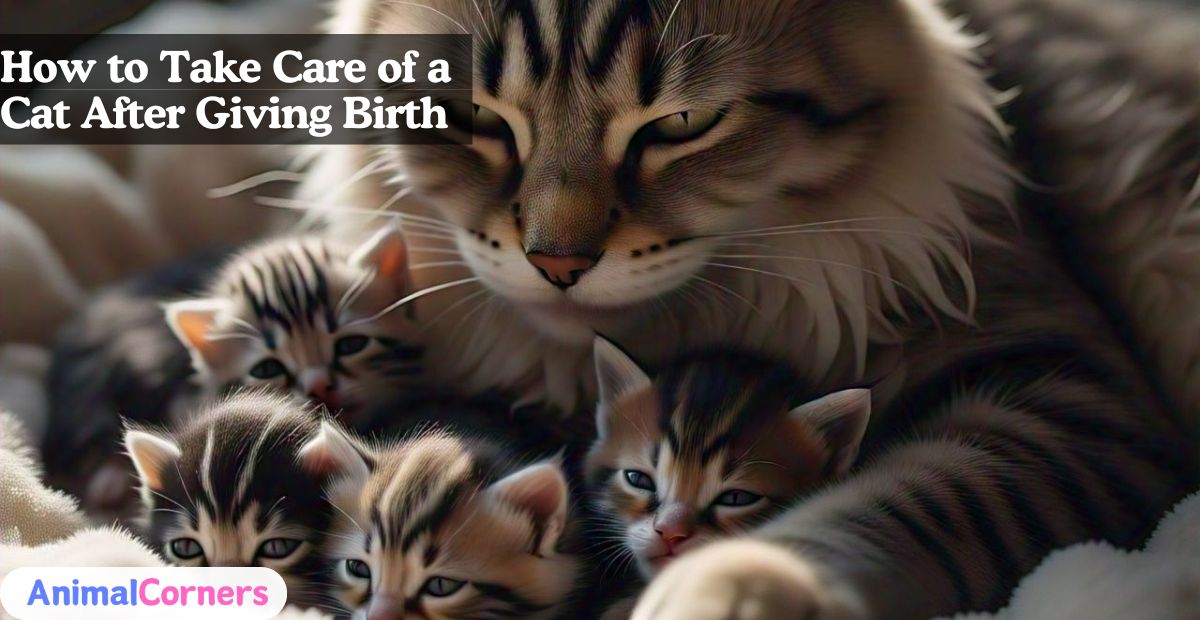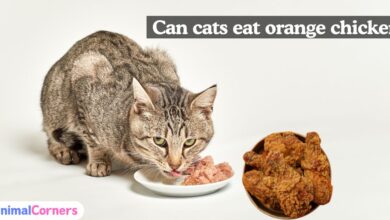How to Take Care of a Cat After Giving Birth

Keeping a cat clean after giving birth or being pregnant is very important for the mother and her kittens. Afterbirth is the attendance of a mother and a newborn for a few days by providing a comfortable environment, adequate nutrition, and an illness check.
Cats are normally solitary animals, but after they give birth, they need more attention when nursing their litter. This period should be patiently managed and closely monitored because, aside from fulfilling the mother’s nutritional requirement, she also has to feel safe.
Make sure she has fresh water to drink and quality food to eat. Also, make sure that the area she will use to feed her kittens is clean. Overall, with the constant attention and information you provide, you are able to provide the best environment for your cat.
In this post we will learn in detail about “how to take care of a cat after giving birth“
(How to Take Care of a Cat After Giving Birth) Create a Safe and Quiet Space
You also have to provide your cat with a quiet place to complete her delivery and to nurse its kittens. Select a small and least trafficked location in your home to place a nesting box or bed for your seed-eating birds. Maintain the home warm and safe in order to alleviate pressure on her. Minimize the talkative employees or reduce the amount of people visiting the area often, as this will cause stress. This assures her of a healthy environment and therefore encourages healthy bonding with her kittens.
Focus on Nutritional Needs
A nursing mother cat takes more nutrients in comparison to a normal cat for it to be in a position to produce milk. They should be fed on high-energy kittens for their optimum nutrition needs for protein and other nutrients. Make some fresh water handy for her to drink with because it helps in the secretion of breast milk. Divide her foods into many small servings to help her avoid losing her energy during the day. Proper feeding enables both the mother and her kittens to get the necessary feed needed during this period.
Keep the Nesting Area Clean
Sanitization is very important for a mother cat and her kittens. Daily, a proper cleaning should be done on the nesting area by replacing all soiled nesting material with clean and dry ones. This aids in avoiding the spreading of diseases in the process of enhancing the environments that enhance the kittens growth. When washing the animals, be careful not to interfere with the bonding process between the mother and the litter. This is specifically important for your cat because a clean environment helps prevent incidences of health complications.
Minimize Handling of the Kittens
Newborn kittens are vulnerable creatures and should be left alone for as much as possible in the first weeks. Overhandling may make the mother frustrated and disrupt her care activities. Let her bring up her kittens on her own unless this is absolutely necessary. This kind of attitude assuages the fear of the mother and, at the same time, ensures that the mother and their litter have a close bond.
Monitor the Mother for Signs of Illness
It is especially important to monitor the cat and especially its activity after the delivery of the kitten. If there are complaints of such symptoms as heavy bleeding, fever, lethargy, or loss of appetite, one needs to consult a veterinarian. These symptoms could be as a result of postpartum complications, for instance, inflammations or retained placentas. Often, your cat is likely to bounce back to normalcy once the vet has detected the problem early enough and provided treatment immediately.
Provide Emotional Support
Female cats may become stressed, particularly when it’s their first time to give birth. Sit close to the person so that you can be there for them and also not be overbearing. It also shows her that you are non-threatening and that she can, in fact, trust that she is safe, even if you do not say much to her. When stressed, the cat will not be able to provide necessary care to her kittens and will also take a longer time to heal.
Encourage Proper Hydration
Malnutrition can be prevented easily if nursing cats supplement their diet with water, which is very vital when nursing. Put water bowls close to her nesting area because she will probably not want to go away from them for a long time to defend her kittens. You can also help them with wet cat formulas for extra water content. This is the reason I make sure she drinks a lot of water to help her produce milk and keep her healthy during this period.
Avoid Major Changes in the Environment
Postpartum cats can be finicky and can become easily offended by a change in environment. They should not bring home a new pet, change furniture, or shift her litter during this time. Conservation of her environment stability enables her to concentrate on nursing as well as taking care of her kittens. Ensuring she follows a steady schedule is the only way that will allow her to recover without much stress.
Transition Diet Gradually
As soon as the kittens start eating solid foods, usually at four weeks of age, start removing the nursing mother from the milk diet. But do this gradually in order not to cause some gears in the stomach to’rebel’. Although the kittens will consume less of her milk, at the same time, the nutritional requirements of the mother cat will be low also. It is gradual, thus helping her health and keeping her digestion in check.
Monitor the Kittens’ Progress
Monitor the kittens’ condition in order to make sure that they’re always nursing, gaining weight, and playing. If you notice any kitten looks sick or does not gain size and weight, then you should visit your veterinarian. Each healthy kitten should be warm, sleepy, and relaxed after eating. Observing the learning of students assists in defining problems that may occur during development and allows for their tracking.
Address Postpartum Depression
In very special conditions, cats can have postpartum depression, which can lead to the kittens not eating or not wanting to eat. In case you find such signs, then visit a veterinarian. The following is useful in helping her deal with these challenges, mainly due to stress.
Schedule a Veterinary Checkup
Both the mother and her kittens should be taken in for a postnatal vet check. The vet can perform a basic health check to ensure the kittens are doing well and what next steps to take in caring for the kittens. To attain the best results, perform this checkup within a week after delivery has taken place.
Socialize the Kittens Gradually
To minimize stress when growing up, start petting the kittens in order to make them used to handling people. This assists them to be in a position to deal with human interaction while at the same time making sure that the mother is okay with the process. By socializing properly, the kittens are eased into their future homes, and they are much more acquainted with humans.
Plan for Spaying
When the mother cat has regained her strength and the kittens are eating solid foods, talk to the veterinarian about spaying. Neutering stops future pregnancies and lessens the chances of some illnesses. It is a sensible action that does not only have a positive effect on your pet cat but also on the numerous pet populations out there.
Be Patient and Observant
Caring for a postpartum cat consists of devoting much attention and being as tolerant as possible. Be attentive, attend to her needs, and remember to be consistent with everything. With your support, she can heal to the fullest and provide a good environment for her kittens. Such a vocation can be fulfilling because you get an opportunity to see your cats grow and interact with one another.
Conclusion
Kittens need to be tended for after giving birth, and this entails time, effort, and lots of tolerance. By giving your cat a clean, quiet, and stress-free environment, you can assist her in her early stages of convalescence as well as the subsequent rearing of her kittens. Providing for her nutritious meals Completely meeting her need in other aspects, such as through food and exercise, besides her need for affection, will make this transition easier. Having healthy kittens is the best compensation because a healthy mother cat will raise healthy kittens.
FAQs
How often should I feed a nursing mother cat?
Offer food multiple times a day or provide free-feeding options. Nursing mothers require more calories, so high-quality kitten food is ideal for meeting their nutritional needs.
When can I handle newborn kittens?
Limit handling during the first two weeks unless necessary. Handling too soon can stress the mother and disturb the kittens’ bonding time.
What signs of illness should I watch for in a postpartum cat?
Watch for symptoms like fever, heavy bleeding, or refusal to eat. Any unusual behavior may indicate complications, so consult your vet immediately.
How can I tell if the kittens are feeding well?
Healthy kittens will be quiet, warm, and active after feeding. Frequent crying or weak movements may signal feeding issues or illness.
When should I take the mother cat and kittens to the vet?
Schedule a postnatal vet visit within a week of delivery. This ensures any health concerns are addressed promptly for both the mother and her kittens.




